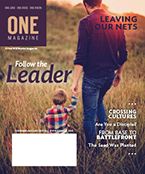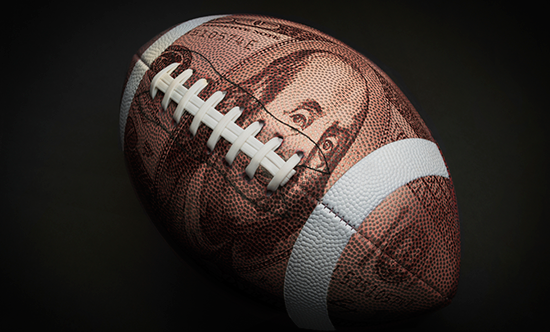
December-January 2016
Follow the Leader
------------------
|






Play the Money Game to Win
By Bill and Brenda Evans
In many homes, January is about football. At our house, it’s also about financial assessment.
We look back over our finances for the past 12 months and set plans for the next 12. Recently, we sipped on a third cup of coffee and started that process.
Money is not just a mathematical or spiritual issue for us. It’s like an emotional, highly-contested football game. Winning a turf brawl over money is not our goal. It’s not a win unless it’s a win for both of us. If one wins and the other loses, that game goes into the loss column. Ties don’t count either. Playing the money game in marriage requires strategies. We’ve put our heads together on some game strategies that work for us.
BRENDA: First of all, we try not to quarrel, but talk and plan. When we downsized back in the summer, we made a budget for sprucing up the new house. Later, we talked again and adjusted that figure based on money in the bank, just like Lee (our football coach son) adjusts plays on the sidelines. Lee wears a headset connected to other coaches—one is perched high above the field in the press box. When his play calling isn’t getting the job done, he consults a coach who has a different perspective and then makes adjustments.
Each of us sees the playing field a little differently. That’s a strength. Bill is best at being certain we’re provided for. I’m best at the beauty and pleasure side—decorating the house or traveling more, for example.
BILL: Yes, you do like to travel.
BRENDA: Remember that insurance policy you bought when the boys were young, and how I ranted on and on about it? We almost fought.
BILL: I remember. It was small, but you were in college, the boys in Christian schools, and all you saw were those tuitions, the grocery budget you had to figure down to the penny, holes in the knees of the boys’ jeans, payments on our rattle-trap car, tithes, missions. That kind of thing.
BRENDA: But you stopped me with a question, didn’t you?
BILL: I asked what you would do if I died and left you and the boys on your own. We lived in a parsonage. You and the boys would have nowhere to go. I told you the insurance money would at least buy you a used trailer.
BRENDA: So I cried and cleared my eyes. I hadn’t known what I wasn’t seeing.
BILL: Dad drilled that into me. Not insurance, but that it was my responsibility to provide for my family. Honorable men do that, he said. It’s a mark of manhood. Remember how he put his arms around us both right after our wedding and told me, “Take care of this little lady, Bill.”
BRENDA: For me, the insurance was a lesson about seeing the big picture. Somehow, we figured out how to cut something somewhere and make the payments. Of course, the Lord helped us.
BILL: A second strategy is that we’re not too optimistic.
BRENDA: And that’s not easy for me because I’m an optimist by nature. But our view is not pessimism; it’s realism, as you say.
BILL: Yes, that’s it. We don’t assume that our finances will be better in the future than in our past or present. That would be like too much cockiness in a football player, the invincibility factor. Well-grounded confidence is different. It considers both offense and defense, as well as the skill and heart of the players. Too much optimism and you disregard risk and dangers as you decide how to spend, borrow, and invest.
BRENDA: You have the will to win, so that’s the heart part. I’m not as competitive, but you’ve given me freedom to exercise the skills I am good at. We each bring strengths to the game.
BILL: We do. You’re not a window shopper or mall crawler. You mostly stay out of those places, except for online used book spots, which you have a weakness for. That caper with the iPhone, P. F. Chang, and Teva sandals is not your usual mode.
BRENDA: Truth is, for me, shopping is work, not entertainment. Plus, if I see it, I might want it. So, I mostly stay away. But since we’re into this football thing, talk about our offensive and defensive strategies.
BILL: You know the maxim that you win games by offense but championships by defense. We’re fairly big on defense: we plan for the what-ifs. We also don’t assume that the Lord will miraculously provide when we haven’t been wise with what he’s given us already. No strut and presumption. He’s never obligated to rescue us from our stupidity. So, we invested 10-15% of our income (and much more later in life) in our retirement plans and maxed out available matching funds. We have a revocable trust at FWB Foundation because access and interest are better than at banks and credit unions. We’re retired but still save monthly. We also buy used—things like cars—and rarely borrow. And we enjoy extras along the way.
BRENDA: What was it your dad said?
BILL: If you can’t afford it, don’t buy it. If you can’t pay your way, don’t go.
BRENDA: We’re also pro-active. We have an offense.
BILL: Yes, give tithes and offerings, pay off credit cards every month—no interest, ever! Shop purposefully and not be suckered out of position by that line on store receipts telling us how much we “saved.” Truth is, you never save when spending.
BRENDA: What about a Hail Mary?
BILL: A Hail Mary is a really risky financial decision, kin to buying lottery tickets and get-rich schemes.
BRENDA: Have we ever done a Hail Mary?
BILL: You mean you don’t remember?
BRENDA: Oh, that junk bond purchase you made years ago. But it wasn’t huge.
BILL: But it wasn’t wise either.
BRENDA: True, we lost yards and mourned in the locker room, didn’t we? (Laughter)
BILL: We did. And the photograph plan you bought when Jeff was a baby. That turned out better. At least we got good pictures.
BRENDA: But I spent a lot of money without talking to you about it. My regret was torture. Of course, you forgave me and comforted me, but I still suffered over it.
BILL: Well, we learn from our fumbles and dropped balls. That’s what you do when you make mistakes: change.
BRENDA: Another thing we’ve noticed in our relationship is the emotional side of money. It’s like a competitive football game; it pulls us in all different directions.
BILL: For me, one of those directions is power. I like feeling I can do anything I want to do. Because of that, I don’t carry a lot of cash. It’s like carrying water or sand in my hands. It dribbles or sifts out a little at a time. For others, it’s credit cards, which is simply borrowing money at a crazy interest rate. Consequences are not good when you’re “chop-blocked” by an enormous plastic linebacker.
BRENDA: Or use money as comfort.
BILL: That, too. Stuff becomes our game ball. We like it. We want it. We hold it tight and close. You know, we boys seldom grow up completely, so we go back to the marks on the wall to see how tall or fast or successful we are. We let stuff become the mark. Let it determine our self-worth, as if we think a lot of stuff says we’re winning the game.
BRENDA: I don’t know how to tally up our score here. I know there’s more we could say about playing the money game in a marriage.
BILL: Let’s just say that the longer we ignore bad financial habits, the harder it is to win. Small changes, tweaking our money game plan immediately, helps turn a game loser into a game winner.
About the Writers: Bill and Brenda Evans live in Ashland, Kentucky. Bill is former director of the Free Will Baptist Foundation and Brenda is a retired English teacher. Visit www.fwbgifts.org for more information on planned giving that benefits your favorite ministry.
|
|

